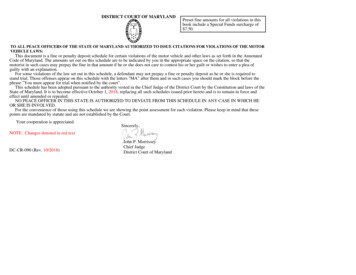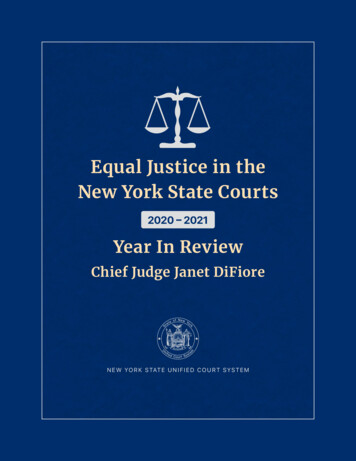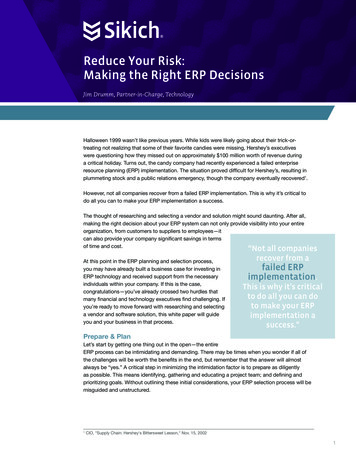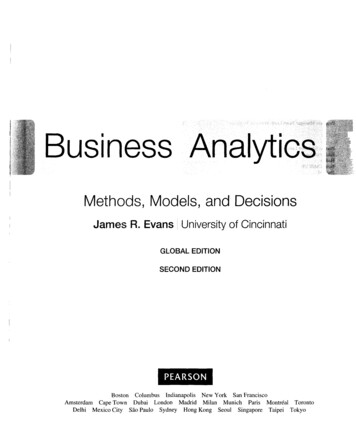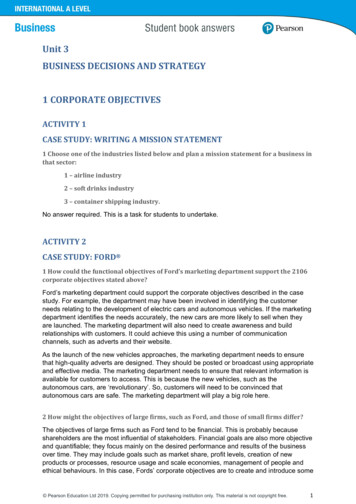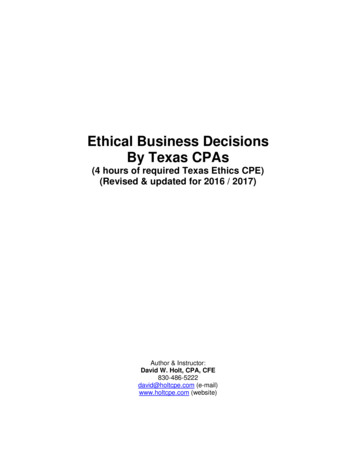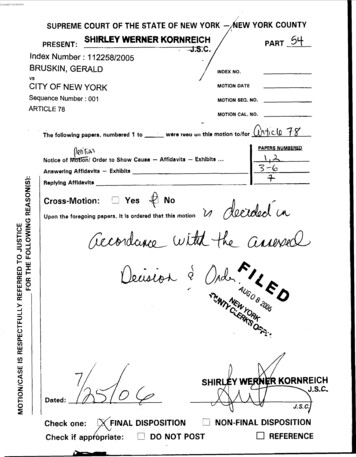
Transcription
SCANNED ON 81812006EW YORK COUNTYSUPREME COURT OF THE STATE OF NEWPRESENT:SHIRLEY WERNER KORNREICHindex Number : 112258/2005BRUSKIN, GERALD/vsCITY OF NEW YORKPART59INDEX NO.MOTION DATESequence Number : 001MOTION EEQ. NO.ARTICLE 78MOTION CAL. NO.were r e m un thls motion tolforThe followlng papers, numbered 1 toPAPERS NU-t)L?hYwNotlce ofOrder to Show CauaeAnswerlng Affldavlts- Affidavits - Exhlblts .7 -6- ExhibitsntReplylng AffldavltsCross-Motion:\,A0 Yes 1 NoFCSLUpon the foregoing papers. It Is ordered that thin motionDated:Check one:Check if appDISPOSITIONU NON-FINAL DISPOSITIONDO NOT POSTREFERENCE
Index No.: 112258/0SGERALD BRUSKIN,DECISIONandORDERPetitioner,For a Judgment Pursuant to Article 78 ofthe Civil Practice Law and Rules-againstCITY OF NEW YORK DEPARTMENT OFHOUSING PRESERVATION & DEVELOPMENTand MUTUAL REDEVELOPMENT HOUSES, INC.,This is a special proceeding pursuant to Article 78 brought by Gerald Bruskin. Petitionernow asks the court to reverse and annul the determination of respondent the City of New YorkDepartment of Housing Preservation and Development (“HPD”). The determination, whichevicted petitioner from an apartment located at 280 9th Avenue, Apartment 17-E, New York,N.Y. (the “Apartment”), was commenced via the service of a certificate of eviction on petitionerby his landlord Mutual Redevelopment Houses, Inc. (“MRH”).I.BackgroundPetitioner became a tenanthhareholder of the subject studio apartment in or around July1997, pursuant to an agreement executed between petitioner and MRH. The apartment wasprovided to petitioner pursuant to Article 5 of the Private Housing Finance Law (“PHFL”) and issubject to HPD supervision, pursuant to a 1959 Regulatory Agreement (the “Agreement”).Petitioner claims that from 1997 onward, he, his wife Anne and his sister were “included as1
household members on the filed income affidavits.”On February 27, 2004, MRH served a Preliminary Notice of Grounds for Eviction (the“eviction notice”) on petitioner. The notice states that petitioner was violating HE’D regulationsin that: (1) he did not occupy the apartment as his “primary place of residence and ha[s] beenresiding at 153 West 95th Street[,] New York, New York” (hereinafter, the “95th Street address”;(2) petitioner had represented to financial institutions that the 95th Street address was hisresidence; (3) petitioner’s phone number was listed at the 95th Street address; (4)he “subletandor assigned [his] rights of occupancy to the Apartment to John andor Jane Doe without theapproval of the [HPD] or [MRH]; (5) he accepted “things of value from occupants asconsideration in exchange for the right to occupy the [Apartment]”; and (6) petitioner “madematerial misrepresentations of facts in securing the occupancy rights to the Apartment[ .I” Thenotice also provided petitioner with ten days in which to cure the violations or face eviction.Thereafter, on April 21,2004, W served petitioner with a Notice of Hearing to be heldbefore the HPD “for the purpose of obtaining a Certificate of Eviction.” The notice, which wasalso addressed to alleged undertenants “Jane and John Doe,” informed petitioner that the“grounds for scheduling said hearing are that [he does] not occupy [the Apartment] as [his]primary residence and that [he has] sublet and/or assigned [his] rights to the Apartment inviolation of [his] occupancy agreement.” After conducting a hearing on August 4,2004, thehearing officer, Frances Lippa, issued her decision (the “HPD decision”), in which she foundthat:some documentation [presented by the parties] reflects the subject apartment as Mi.Bruskin’s address, some documentation reflects Mr. Bruskin’s address as West 95thStreet, and some documentation reflects the subject apartment as Mr. Bruskin’s addressbut is not reliable or credible proof of primary residency.2
The HPD hearing officer concluded that “the documentation reflecting the subjectapartment as Mr. Bruskin’s address is not sufficient to prove that the subject apartment remainedhis primary residence.” Ms. Lippa noted that there was a lack of “significant, credibledocumentation” that proved Mr. Bruskin resided in the apartment and did not find his“testimony, which was somewhat vague on occasion, to be credible proof that the subjectapartment remained his primary residence.” On the other hand, MRH presented evidence that MrBruskin’s voter registration reflects the 95 Street address as of the 2000 election. Additionally,an HPD Multiple Dwelling Registration and an Internet telephone listing indicate the 95 Streetaddress as Mr. B r u s h ’ s residence.II.Conclusions of LawInitially, the court will only consider the portions of Mr. Bruskin’s reply papers that areresponsive to respondents’ answers. See Azzopardi v. American Blower Corp., 192 A.D.2d 453,454 (1st Dept. 1993) (on summary judgment motion function of reply affidavit is “to addressarguments made in opposition to the position taken by the movant and not to permit the movantto introduce new arguments in support of the motion”). See also Lumbermens Mut. Cas. Co. v.Morse Shoe Co., 21 8 A.D.2d 624,625-26 (1st Dept. 1995) (party may not use reply affidavit toshift burden to demonstrate material issue of fact where opposing party “has neither theobligation nor opportunity to respond absent express leave of court”),In an Article 78proceeding, the court cannot interfere with an administrative tribunal’s exercise of discretion“unless there is no rational basis for the exercise of discretion or the action complained of isarbitrary and capricious.” Pel1 v. Board of Education, 34 N.Y.2d222,231 (1974). “If thedetermination is rational, it must be upheld, even though the court, if viewing the case in the firstWest ViZZuge Assocs. v. Division of How.instance, might have reached a different concl sion. 3
& Community Renewal, 277 A.D.2d 111, 112 (1st Dept. 2000).A.Petitioner’s First, Third and Fourth Causes of Action Must Be DeniedIn his first cause of action, petitioner argues that the W D “impermissibly ignored MRH’sinitial burden of proof.” However, the cases that petitioner cites in support of his argument areinapposite, since those cases were not governed by the HPD regulations applicable here.See Sharp v. Melendez, 139 A.D.2d 262,265 (1st Dept. 1988) (subject apartment regulated byrent stabilization law); Kutz v. Gelman, 177 Misc. 2d 83, 84 (App. Term, 1st Dept. 1998). Onthe other hand, a 1987 amendment to the Agreement, provides that “as a condition of eligibilityfor occupancy and continued occupancy that the apartment of the tenant/cooperator be intendedto be at initial occupancy and continue afterwards to be his or her primary place of residence.”Agreement, sec. 209 (c). Further, “[tlhe tenant/cooperator whose residency is being questionedwill be obligated to provide proof that his or her apartment is his or her primary place ofresidency.” Id. Thus, the HPD hearing officer applied the proper burden of proof in the evictionproceeding.Although, in his third cause of action, petitioner claims that MRH may not establish anillegal sublet where a family member occupies the apartment, the casts he cites in support againare inapposite. See PL WJ Realty, Inc. v. Gonzalez, 285 A.D.2d 370 (1st Dept. 2001) (does notconcern family member); Park HoZding Co. v. Rosen, 241 A.D.2d 304 (1st Dept. 1997) (setsforth no facts regarding family member). While the relevant HPD rules provide that“[t]enant/cooperator and Family Members of tenant/cooperator(s) . . . shall have the right tooccupy the tenant/cooperator(s)’ apartment[,]” (Agreement, sec. 210) it prohibits unapprovedsublets, providing that “[nlo tenadcooperator shall have the right to sublet without prior written4
approval of the Housing Company and of HFD. No tenanthooperator shall have the right toassign.” Id., sec. 209 (a). Thus, the HPD was not precluded from finding that Mr. B r u s hillegally sublet his apartment, even were such sublet made to a family member, where there wasno prior written approval.Similarly, the fourth cause of action must be denied. Petitioner argues that the HPDcertificate of eviction must be vacated since MRH “failed to name and serve necessary parties tothwart petitioner’s family members from seeking succession rights.” Presumably, petitionerrefers to his wife and sister, both of whom he claims were residents of the apartment. However,petitioner has no standing to assert these claims. Before a party can establish standing tochallenge a determination, “a petitioner must show that it would suffer direct harm, injury that isin some way different from that of the public at large[.]” Lee v. Nav York City Dep ‘t of Hous.Preservation h Dev., 212 A.D.2d 453,454 (1st Dept. 1995). Here, petitioner’s wife and sisterare the parties who would, arguably, be aggneved by their lack of inclusion in the underlyingHPD proceeding. However, neither of those parties have moved for any relief in the instantproceeding. Thus, petitioner may not now assert these claims on their behalf.Moreover, pursuant to HPD provisions, petitioner’s family members would be unable toapply for succession rights while the apartment served as petitioner’s primary residence, as heargues it does. Finally, the underlying HPD hearing named additional parties “John and JaneDoe,” and petitioner’s counsel at that time noted that he represented all parties. No other partyasserted any rights in that proceeding.B.Petitioner’s Second Cause of ActionThis cause of action involves an issue as to whether the HPD determination made as aresult of a hearing held, and at which evidence was taken, pursuant to direction of law is, on theentire record, supported by substantial evidence (CPLR 7803(4)).5
Specifically, petitioner claims that MRH failed to establish, by its proof, that petitionerdid not use the apartment as h s primary residence. Since the petition questions the interpretationof evidence at the administrative hearing, the matter must be transferred to the AppellateDivision, First Department. See Hummer1 v. Mavis, 41 A.D.2d 724 (1st Dept. 1973) citing CPLR7804(g). Accordingly, it isORDERED and ADJUDGED that the petition’s first, third and fourth causes of action aredenied and those causes of action are dismissed; and it is furtherORDERED that petitioner’s second cause of action, seeking to vacate and annul thedetermination by respondent HPD is respectfully transferred to the Appellate Division, FirstDepartment, for disposition, pursuant to CPLR 7804(g); and it is furtherORDERED that the Clerk is directed to transfer the file to the Appellate Division, FirstDepartment, upon service of a copy of this order with notice of entry.Date: July 25, 2006New York, New York6
and MUTUAL REDEVELOPMENT HOUSES, INC., DECISION and ORDER This is a special proceeding pursuant to Article 78 brought by Gerald Bruskin. Petitioner now asks the court to reverse and annul the determination of respondent the City of New York Department of Housing Prese

